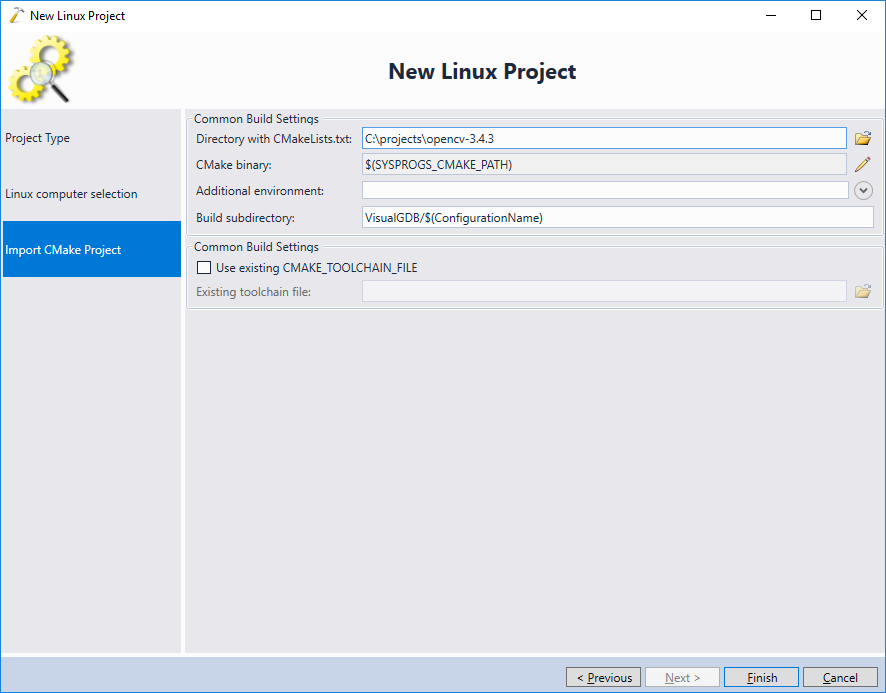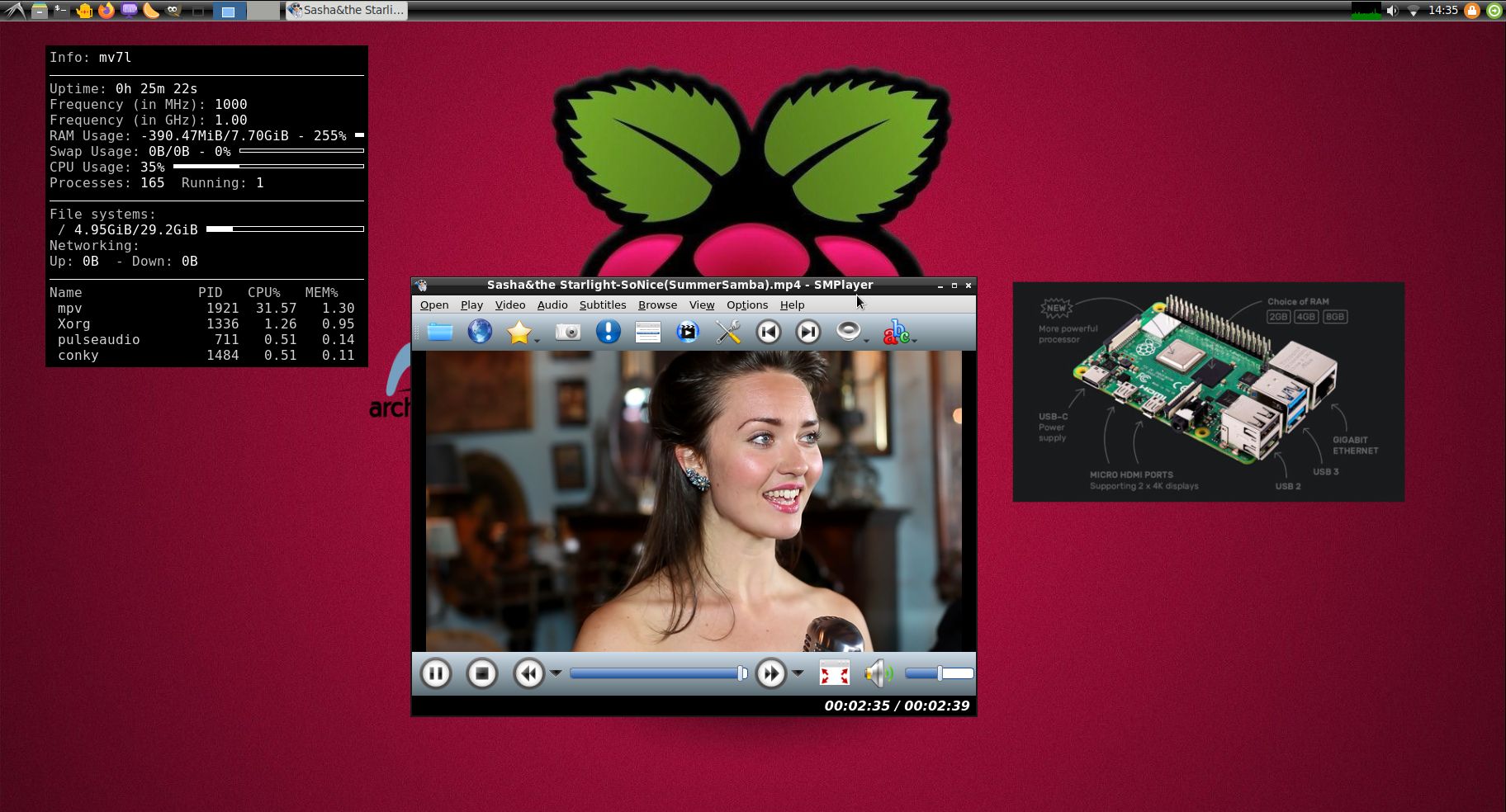

- #INSTALL OPENCV RASPBERRY ARCH LINUX C RELEASE BUILD INSTALL#
- #INSTALL OPENCV RASPBERRY ARCH LINUX C RELEASE BUILD ANDROID#
- #INSTALL OPENCV RASPBERRY ARCH LINUX C RELEASE BUILD CODE#
- #INSTALL OPENCV RASPBERRY ARCH LINUX C RELEASE BUILD DOWNLOAD#
The stripped version appears to be twice as small.
#INSTALL OPENCV RASPBERRY ARCH LINUX C RELEASE BUILD ANDROID#
Note If the size of the created library is a critical issue (like in case of an Android build) you can use the install/strip command to get the smallest size as possible.

# Change 8 to number of hardware threads available. Įnter the created temporary directory cmake_binary_dir and proceed with: $ make -j8 # -j8 runs 8 jobs in parallel. $ cmake -D CMAKE_BUILD_TYPE=RELEASE -D CMAKE_INSTALL_PREFIX=/usr/local.

Launch Git client and clone OpenCV repository Getting the Cutting-edge OpenCV from the Git Repository
#INSTALL OPENCV RASPBERRY ARCH LINUX C RELEASE BUILD DOWNLOAD#
Download the source tarball and unpack it.You can use the latest stable OpenCV version available in sourceforge or you can grab the latest snapshot from the Git repository. Libjpeg-dev libpng-dev libtiff-dev libjasper-dev libdc1394-22-dev
#INSTALL OPENCV RASPBERRY ARCH LINUX C RELEASE BUILD INSTALL#
$ sudo apt-get install python-dev python-numpy libtbb2 libtbb-dev Libavcodec-dev libavformat-dev libswscale-dev $ sudo apt-get install cmake git libgtk2.0-dev pkg-config The packages can be installed using a terminal and the following commands or by using Synaptic Manager: $ sudo apt-get install build-essential

Īfter this job is done, just make a few adjustments. WITH_V4L=ON -D INSTALL_C_EXAMPLES=ON -D INSTALL_PYTHON_EXAMPLES=ON -D BUILD_EXAMPLES=ON -D WITH_GTK=ON -D WITH_OPENGL=ON. $ cmake -D CMAKE_BUILD_TYPE=RELEASE -D CMAKE_INSTALL_PREFIX=/usr/local -D WITH_TBB=ON -D BUILD_NEW_PYTHON_SUPPORT=ON -D $ tar -xvjpf OpenCVXX( Download version for linux ) $ sudo apt-get -y install build-essential cmake cmake-qt-gui pkg-config libpng12-0 libpng12-dev libpng++-dev libpng3 libpnglite-dev zlib1g-dbg zlib1g zlib1g-dev pngtools libtiff5-dev libtiff5 libtiffxx0c2 libtiff-tools I do not know the above error but you can install OpenCV by following the steps below at Raspberry Pi. I added the required flags to the PKGBUILD file in cmakeopts which are: -DWITHQTOFF -DWITHGTKON. If you haven’t already booted into the Desktop, I couldn't find a package for opecv in either the main repo or aur that supports GTK by default. Most of the options can be found in the root cmake script of OpenCV: opencv/CMakeLists.txt. In this reference we will use regular command line. Initial cache files: cmake -C myoptions.txt. Running the Script requires the Raspbian Desktop. Configuration options can be set in several different ways: Command line: cmake -Doptionvalue. D OPENCV_EXTRA_MODULES_PATH=~/opencv_contrib-3.0.0/modules \ĭownload the Script and sample image with Libxvidcore-dev libx264-dev libgtk2.0-dev \ Libavcodec-dev libavformat-dev libswscale-dev libv4l-dev \ Libjpeg-dev libtiff5-dev libjasper-dev libpng12-dev \
#INSTALL OPENCV RASPBERRY ARCH LINUX C RELEASE BUILD CODE#
Sudo apt-get install -y build-essential git cmake pkg-config \ It's FREE Download Code echo 'OpenCV installation by ' cvVersion'masrer' We are also going to clean build directories and create installation directory. Here I use 4.5.3.Installing open cv is very easy just do this. Therefore I recommend to run the below command that installs the latest known working version. Furthermore, the installation may take a very long time. The standard command to install opencv is pip install opencv-contrib-python but don’t immediately run this (!) as it will try to install the latest versio of OpenCV, which is not always fully functional on the Raspberry Pi. Note that if you still have python2.7 on your system and you are not working with a virtual environment with python3, you will need to type in pip3 rather than pip. Sudo apt-get install build-essential cmake pkg-config libjpeg-dev libtiff5-dev libjasper-dev libpng-dev libavcodec-dev libavformat-dev libswscale-dev libv4l-dev libxvidcore-dev libx264-dev libfontconfig1-dev libcairo2-dev libgdk-pixbuf2.0-dev libpango1.0-dev libgtk2.0-dev libgtk-3-dev libatlas-base-dev gfortran libhdf5-dev libhdf5-serial-dev libhdf5-103 python3-pyqt5 python3-dev -yįinally, we can install OpenCV very simply using pip.


 0 kommentar(er)
0 kommentar(er)
